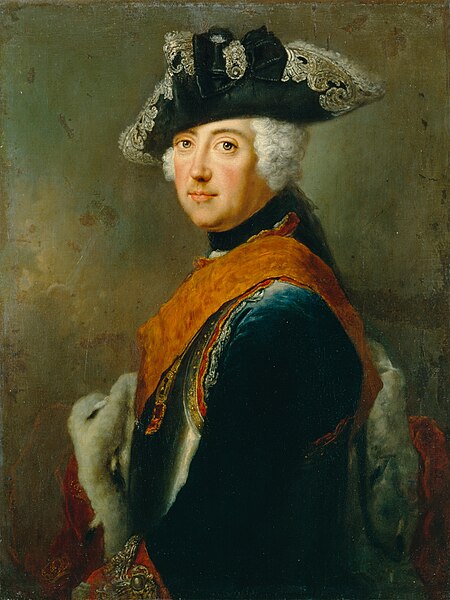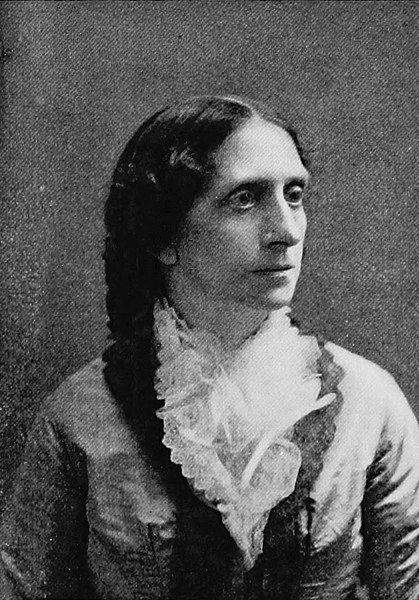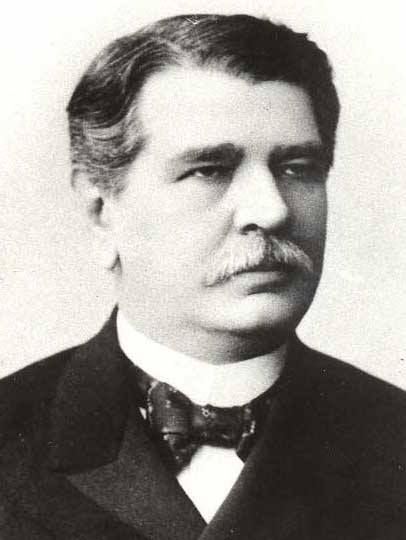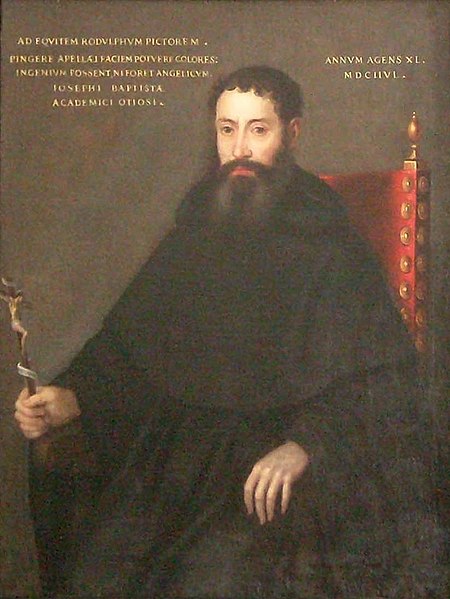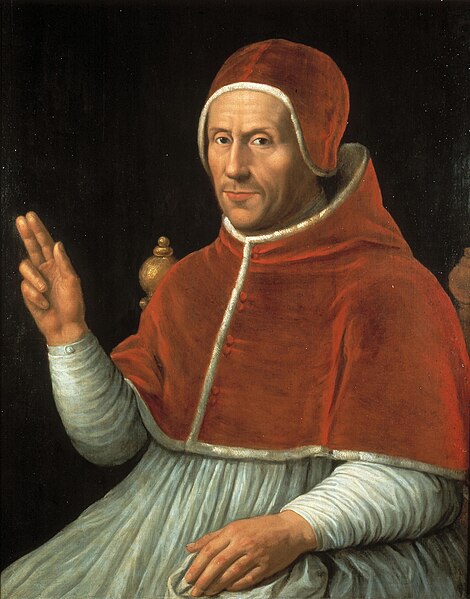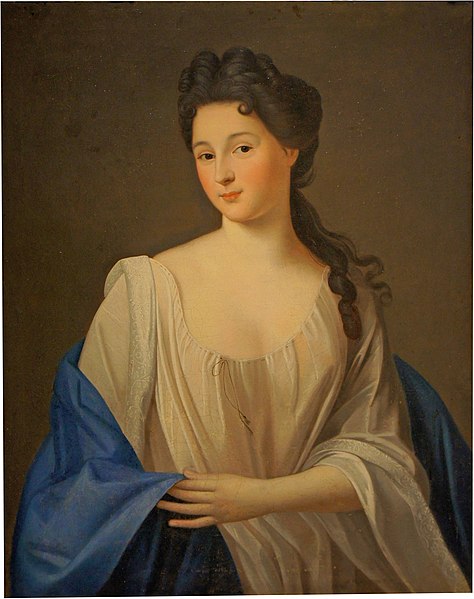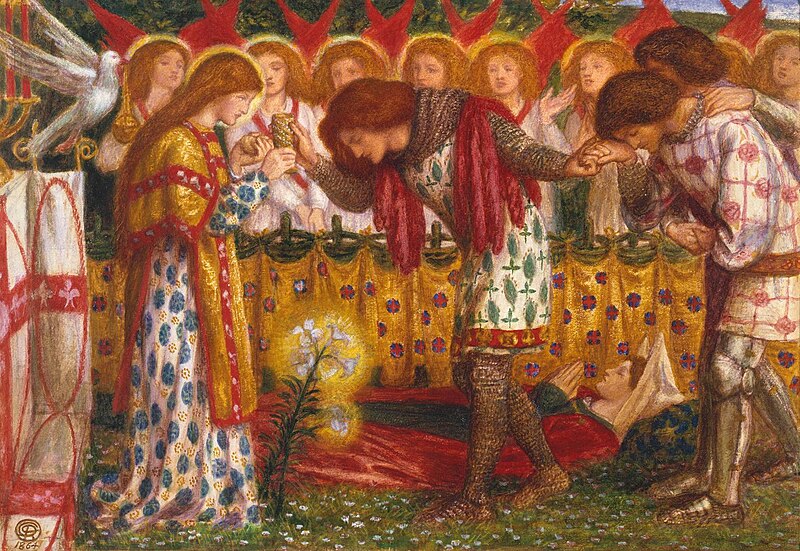
How Sir Galahad, Sir Bors and Sir Percival Were Fed with the Sanct Grael; but Sir Percival’s Sister Died by the Way (1864), by Dante Gabriel Rossetti
Gaheris is the brother of Gawain, Gareth, Mordred, and Agravain, and the son of King Lot. His mother is either Morgause or Belisent. Because his name is so similar to Gahariet, the earliest form of Gareth, some scholars believe they may have originally been one and the same. If this name isn’t related to Gareth, it may derive from the Welsh name Gweir, which can mean circle, loop, collar, bend, or hay.
Galahad comes from the original French name Galaad, which probably derives from the Old French name for the Gilead region in Israel and thus means “heap of witness.” Sir Galahad is the son of Elaine and Lancelot, and the purest Knight of the Round Table.
Galehaut is probably Breton or Welsh, and may be related to the Middle French word hault (elevated, high). He’s the son of a giantess, a good friend of Lancelot, and sometimes called the High Prince. This name and character are completely separate from Galahad, despite the similar spellings.
Gareth was created by Thomas Malory in the 15th century, and based on the French name Gaheriet or Guerrehet. The Middle French form is Gaheriet. Its ultimate origin may be the Welsh name Gwrhyd (valour) or Gwairydd (hay lord). Gareth is a brother of Gawain.
Gawain may derive from the Old Welsh name Gwalchmai, which is composed of roots gwalch (hawk) and Mai (May) or mai (field, plain). The French form is Gauvain; an alternate English form is Gawaine; the Picard form is Gueuvain; and the Latin form is Gualguainus.
1903 Howard Pyle drawing of Sir Gawain
Geraint may be a Welsh form of the Latin name Gerontius, which derives from the Greek word geron (old man). He’s Enid’s husband and a Knight of the Round Table.
Gliglois is Gawain’s squire.
Gorlois is Igraine’s husband.
Griflet is a Knight of the Round Table.
Guigenor is the son of Clarissant and Guiromelant.
Guiomar may derive from the Ancient Germanic name Wigmar, which is composed of roots wig (battle, war) and mari (famous). He’s a cousin of Lady Guinevere.
Guiromelant is Clarissant’s husband and Guigenor’s father.
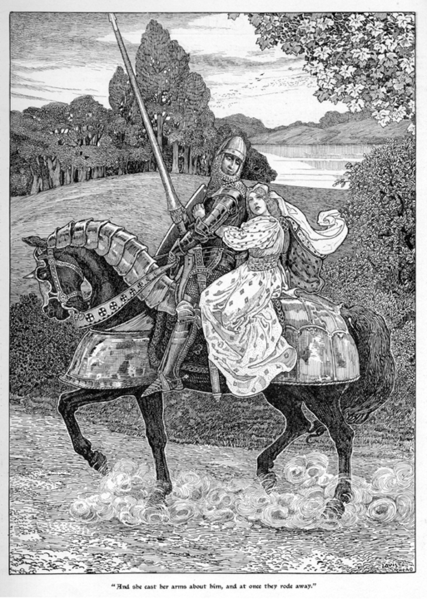
1898 George Wooliscroft Rhead and Louis Rhead illustration of Alfred, Lord Tennyson’s poem “Geraint and Enid”
Hector comes from the Greek word hektor (holding fast), and ultimately echo (to hold, to possess). Though the best-known classical bearer of this name is the Trojan warrior in The Iliad, this is also the name of King Arthur’s foster father.
Hiderus is a Latinised form of Edern, which derives from Old Welsh root edyrn (heavy, immense; wonderful, prodigious, marvellous). Previously, it was wrongly believed to come from the Latin word aeternus (eternal). This form of the name appears in Geoffrey of Monmouth’s chronicle Historia Regum Brittaniae. Edern is a Knight of the Round Table.
Hoel is the Breton form of the Welsh name Hywel, which comes from Old Welsh Higuel. Loosely, it translates as “prominent, eminent,” but it literally means “well-seen.” He’s a Breton king who allies with King Arthur.
Iwein is the German form of Owain, which probably ultimately derives from the Greek name Eugenios (well-born). This form of the name appears in Hartmann von Aue’s epic poem Iwein, written about 1200. He’s a Knight of the Round Table.
Jaufre is the Languedocian form of Jaufré, which in turn is the Gascon and Provençal form of the English and French name Geoffrey. The first part of the name may derive from Old German gawi (territory), walah (foreigner), or *gautaz (Geat, a North Germanic tribe), and the second part comes from Old German fridu (peace). Jaufre is the eponymous hero of the only known surviving Occitan Arthurian romance, and he’s equivalent to Sir Griflet.

Piety: The Knights of the Round Table about to Depart in Quest of the Holy Grail (1849), by William Pyle
Kalogreant is the German form of Calogrenant, a Knight of the Round Table. This name also appears in Hartmann von Aue’s poem.
Kay comes from the Welsh name Cai or Cei, and possibly ultimately the Latin name Gaius, which may derive from the Latin verb gaudere (to rejoice) or be of unknown Etruscan origin. Sir Kay is one of the first Knights of the Round Table, and was originally written as a brave hero. Later on, esp. in the poems of Chrétien de Troyes (who uses the spelling Kex), he transmogrifies into an unrefined boor.
Kea is a Cornish name which probably derives from the same roots, though he’s completely different from Kay. He convinces Queen Guinevere to become a nun after the death of King Arthur.

Lancelot and Guinevere (1890s), by Herbert James Draper
Lamorak may derive from the French l’amour (the love) or be a corruption of the Middle Welsh name Llywarch, which in turn may come from the hypothetical Old Celtic name *Lugumarcos and thus ultimately the Old Welsh roots llyw (leader) and march (horse). The first part of the name may also come from Lugos, the Celtic god of craftsmanship and commerce, which possibly has the Indo–European root *lewk- (light, brightness), *lewg- (dark), or *lewgh- (oath). Lamorak is a Knight of the Round Table, and sometimes named as a brother of Percival.
Lancelot may be an Old French nickname for the Ancient Germanic name Lanzo, which in turn was originally a nickname for Old Saxon and Old Frankish names starting with Land (same meaning in English). During the Middle Ages, it became associated with the Old French word lance (spear, lance). Sir Lancelot is the bravest Knight of the Round Table, though he later causes the ruin of Arthur’s kingdom when he starts an affair with Queen Guinevere.

Queen Guinevere bidding farewell to Sir Lancelot (19th century), by Emil Teschendorff
Leodegrance is Queen Guinevere’s father,
Lionel is a French diminutive of Léon (lion). He’s a brother of Sir Bors.
Lohengrin derives from the German name for the French Lorraine region, and thus means “kingdom of Lothar.” Lothar in turn comes from the Ancient Germanic name Hlothar (famous army) and roots hlut (lord, famous) and heri (army). The German form is Loherangrin. He’s a son of Sir Parzival, the eponymous hero of Wolfram von Eschenbach’s 13th century romance.
Lot, or Loth, is Sir Gawain’s father and King of Lothian. This name is completely separate from the Hebrew name Lot, which rhymes with “boat” and means “veil, covering.”


